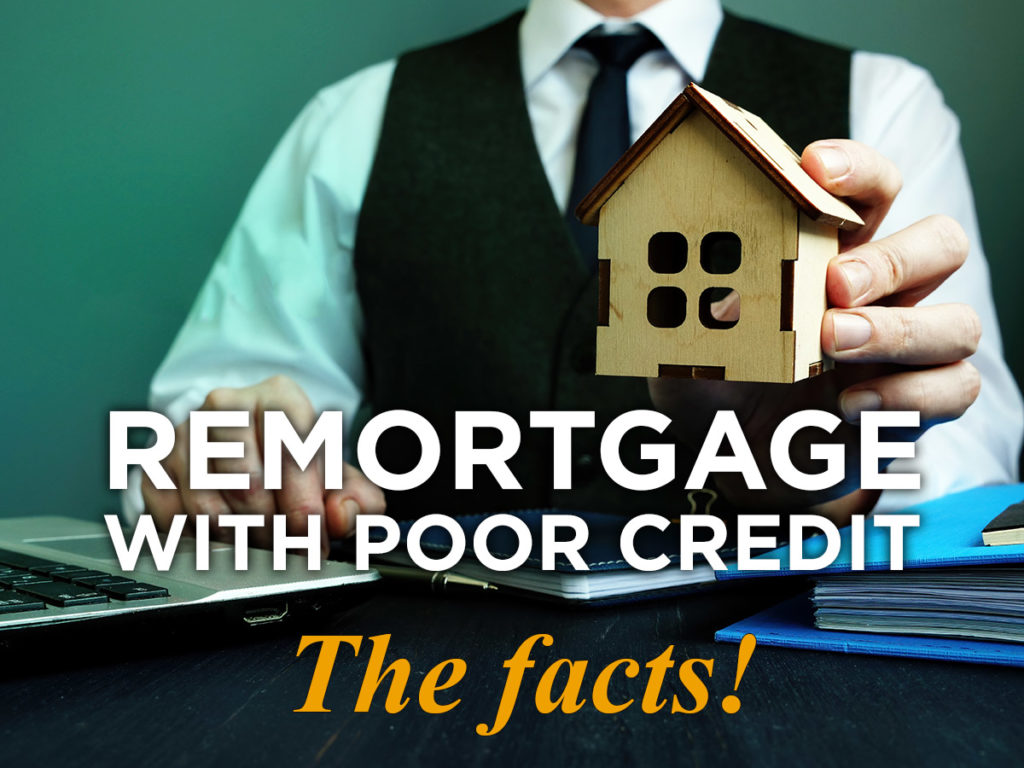Are you looking to Remortgage but have Poor Credit
Are you thinking about remortgaging? Are you unsure what that term means? Are you worried your credit score may let you down or even prevent you from remortgaging altogether?
We’re here to help. In this article, you’re going to learn:
- What remortgaging is
- Why you might do it
- What we mean by a credit score
- How to remortgage with low credit score
What does it mean by remortgaging?
The basic idea of remortgaging is to leave your current mortgage deal and swap to another one. A remortgage means switching to a different lender for the whole mortgage, including any extra you’re taking out.
In the case of a possible remortgage bad credit scenario, it is vital to understand that it may still be possible to get a remortgage. A poor credit score may include one or more of the following events:
- Missed payments (on the mortgage or other loans including credit cards)
- Defaults
- CCJs (county court judgments)
The more negative events you have on your credit record, the lower your credit score is likely to be. You can repair it, but this can take time.
Even if a remortgage isn’t possible, there are other possible solutions Clever Mortgages can help with. We’ll come to those later in this article.
Find out more about credit scores here
What reasons can I remortgage for?
There are many reasons why homeowners consider remortgaging their property. Some people may wish to remortgage to take advantage of equity in their property. This means the property must be worth more than the amount on the mortgage. Statistics show that in December 2019, 16,820 remortgages were taken out with extra borrowing involved.
Here are some of the main reasons you may do this. Incidentally, you may remortgage for more than one reason, for example to consolidate debt and release a little more on top for another purpose.
Debt consolidation
The interest rate on a personal loan, car loan, credit or store card can be higher than that paid on a mortgage. If you’re paying a lot of money each month to meet these kinds of repayments, consolidating them into your mortgage could reduce your monthly expenditure.
However, it is always important to balance any potential monthly savings with the cost of adding the debts over the term of the mortgage. Be aware that any unsecured debts consolidated will become secured on the property.
A mortgage broker can talk you through this and assess the best option for you.
Home improvements
This could mean a new extension, whether over one or two floors. You may want to add a separate garden building to create a working from home space (something that could become more popular post pandemic). You may simply wish to convert part of your existing property to improve it or use it for another reason. For instance, you may convert a cold conservatory into a working from home space by adding underfloor heating and new furniture.
To free up cash for a family member’s house deposit
If you’re a parent wanting to help a child with a deposit for their own home, you may remortgage to access some of the equity in your own home.
To take advantage of a lower interest rate
The Bank of England base rate is currently lower than at any other point in history. We cannot assume it will stay that way forever, but if your current mortgage was taken out when interest rates were higher, you may find better deals on the market now.
To begin to rebuild a credit file
If you’ve had too much debt in the past and you’ve struggled to repay it, you may have gone onto a debt management plan. If so, you may wish to remortgage to consolidate this. in doing so, you could start to rebuild and improve your credit file.
To save money on monthly repayments
Not all reasons for remortgaging involve additional borrowing. In some cases, it’s all about getting a better rate on the current mortgage with a lower monthly repayment. If you’re on a standard variable rate and paying too much each month, a new deal could see you switch to cheaper monthly repayments. Over the lifetime of the loan, this could lead to a far lower amount of interest paid on the mortgage.
Watch our video on the remortgage application process
What is a UK credit score?
A credit score is a three-digit number applied to an individual. It tells lenders whether an individual is a high or low risk candidate for any kind of loan. It is slightly different from a credit rating, which indicates where you sit within various bands used by a lender. These bands or scales aren’t the same at all lenders, hence why there are situations where people may be rejected by one lender and accepted by another.
What is a good credit score?
Different credit rating agencies in the UK work on different numerical systems. For example, Experian goes up to 999, and anything between 881-960 is deemed good. At Equifax, the score goes up to 700. A good score with them is between 420-465.
What is a bad credit score UK?
A fair credit score with Experian starts at 721, so if yours is lower this will dip into poor or very poor territory, depending on how low it goes.
Equifax’s fair territory begins at 380, with anything below that deemed poor or very poor.
Find out more about credit scores here
Can you remortgage with poor credit?
Yes, although your range of lenders may be smaller. Fortunately, Clever Mortgages specialises in helping those with poor credit find the right remortgage. We can guide you to the best lenders in the marketplace – ones you may not be familiar with. It’s common to find interest rates are higher on higher risk remortgages like these, but we’ll scour the market to find a competitive deal for you.
Do I need a credit check to remortgage?
If you switch to another deal with the same lender without asking to borrow more money, then no, you shouldn’t be credit checked. However, if you want to increase your mortgage or change to a new lender, any lender that considers you for a remortgage will want to know you are credit worthy. This will involve checking your credit score and assessing your suitability.
What you need to know before remortgaging
Firstly, if you’re approaching the end of your existing mortgage deal, make sure you start looking for a replacement deal three or four months ahead of the expiry date. If you don’t, your lender may switch you to their standard variable rate, which can be higher than getting another deal.
Next, make sure you shop around. Many people want to get a competitive deal as it could save them money each month, and more over the life of the mortgage. Some lenders may waive certain fees (such as arrangement fees), but they may charge a higher interest rate.
An experienced broker can weigh up different offers and consider all the figures and calculations before recommending one or more of the most competitive deals. This can take a lot of hard work out of the process for you. You may wade through lots of small print and miss some crucial facts, whereas a broker will know what to look for and how to accurately compare different deals.
You should also consider any charges involved with moving your mortgage. If you switch before you reach the end of your existing mortgage deal, there may be early repayment charges. A broker can advise on all relevant charges involved in remortgaging, both with your current deal and the one you may switch to.
Should you use a broker to remortgage?
There’s plenty to think about when you’re considering a remortgage, especially a bad credit score remortgage. There are plenty of lenders out there today, from banks to building societies you’d recognise the names of, through to smaller more specialist lenders. If you’re looking to remortgage with low credit score, you may benefit from our experience in this area. We specialise in helping those with bad credit. We can identify which lenders are most likely to approve each client in their unique situation.

Why use a mortgage broker?
Most of our customers have had some form of credit difficulties, from low credit score, missed payments or declined a mortgage elsewhere.
- Valuable knowledge, through years of experience helping customers
- Bad credit / poor credit experts
- Find the right mortgage first time
- Some mortgages are only available through a broker
- Help with the application process
- Advice on all options available, such as help to buy, guarantor or shared ownership
- Read more on what a mortgage broker does for you
Are there alternatives to remortgaging?
Yes, so if you’re unable to go for remortgaging with bad credit, there are still options to think about. These include:
- A further advance with the same lender
- A product transfer, i.e., switching to a different mortgage product with the same lender to get a better deal
- A secured loan, i.e., taking out a loan backed by your property if you have enough equity in it to support this option
If this all sounds complicated, don’t worry. Clever Mortgages has extensive experience in helping our clients find the best remortgaging possibilities for their needs. And in cases where a remortgage isn’t possible, we can assist in exploring other options as shown above.
The idea of remortgaging can be overwhelming. Even if you think you may be able to save money if you change to another deal, you may be worried your low credit score may let you down. By coming to Clever Mortgages, you can take advantage of our expertise and knowledge in helping people tackle remortgaging with bad credit. Get in touch with us today to find out more. You could be closer to finding a suitable deal than you think.
Have you ever wondered how much you could borrow?
Complete our quick and simple form to get an overview of how much you could potentially borrow and estimated monthly payments.*




